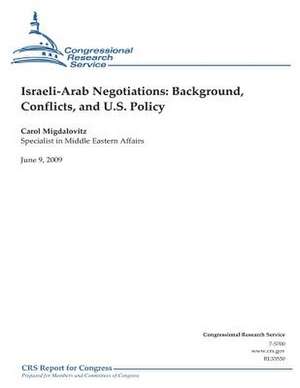Israeli-Arab Negotiations
Autor Carol Migdalovitz, Congressional Research Serviceen Limba Engleză Paperback
Preț: 101.22 lei
Nou
Puncte Express: 152
Preț estimativ în valută:
19.37€ • 20.71$ • 16.15£
19.37€ • 20.71$ • 16.15£
Carte disponibilă
Livrare economică 28 martie-11 aprilie
Preluare comenzi: 021 569.72.76
Specificații
ISBN-13: 9781475278866
ISBN-10: 1475278861
Pagini: 50
Dimensiuni: 216 x 279 x 3 mm
Greutate: 0.14 kg
Editura: CREATESPACE
ISBN-10: 1475278861
Pagini: 50
Dimensiuni: 216 x 279 x 3 mm
Greutate: 0.14 kg
Editura: CREATESPACE
